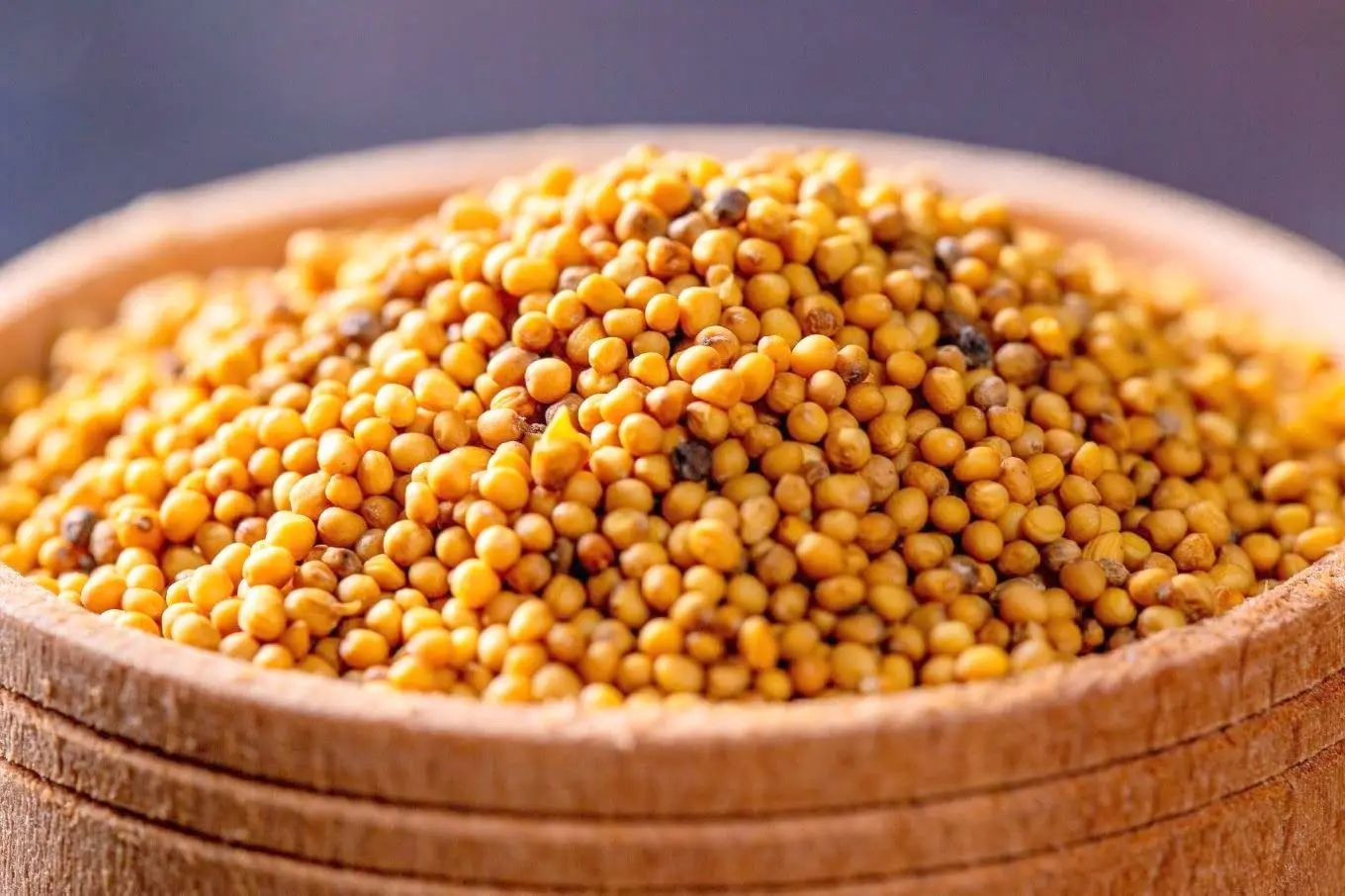- 0086-571-85302990
- sales@greenskybio.com
Mustard Seeds: Nutritional Powerhouses with Surprising Health Benefits
2025-10-13

Mustard seeds, small but incredibly potent, have been celebrated for centuries for their culinary and therapeutic qualities. These tiny seeds, derived from the mustard plant, have transcended their roles as kitchen staples, emerging as nutritional treasures packed with essential vitamins, minerals, and compounds that promote overall health, energy, and immunity.
A Time-Honored Pantry Staple and Healer
For ancient civilizations such as the Egyptians, Greeks, and Romans, mustard seeds were more than a way to enhance the flavor of meals. Their medicinal properties were legendary—used to ease inflammation, improve digestion, and add zest to meats. As the seeds journeyed across the globe, they became entrenched in the culinary traditions of diverse cultures, finding their way into everything from Indian curries to European condiments. Today, mustard seeds continue to be prized for their nutritional benefits and remain an integral component of cuisines worldwide.
Types of Mustard Seeds
Mustard seeds mainly fall into three varieties, each offering unique flavors and uses:
Black mustard seeds: The most pungent, often used in Indian and Southeast Asian cuisine for their bold flavor.
Brown mustard seeds: Spicier and versatile, common in Indian and Mediterranean dishes.
Yellow mustard seeds: Milder and popularly used in American-style mustards and sauces.
These seeds are used in various forms, including whole seeds (tempered in cooking, pickled, or sprinkled on salads), ground powder (key in condiments like Dijon mustard), and mustard oil (popular in South Asian cooking for its sharp flavor).
Nutritional Highlights
Despite their tiny size, mustard seeds are a powerhouse of nutrients. A 100-gram serving provides about 508 calories, along with a rich profile of carbohydrates, proteins, and healthy fats, making them a well-rounded addition to any diet.
The seeds are rich in essential vitamins and minerals:
Vitamins: They contain vitamin A (eye health and immunity), vitamin C (collagen production and immune support), vitamin E (cell protection), vitamin K (bone health and blood clotting), and B-complex vitamins essential for energy production and brain health.
Minerals: Packed with calcium, magnesium, potassium, iron, phosphorus, and zinc, these nutrients contribute to strong bones, heart health, oxygen transport, and immune function.
Amino Acids: Mustard seeds offer all nine essential amino acids, as well as several non-essential ones, supporting hormone production, muscle repair, and overall cellular health.
Health Benefits of Mustard Seeds
Mustard seeds contain antioxidants, minerals, and bioactive compounds that have been linked to several health benefits.
Anti-Inflammatory and Antioxidant Properties Compounds like glucosinolates and isothiocyanates help protect cells from oxidative damage and reduce inflammation. This may lower the risk of chronic diseases such as cardiovascular conditions and even cancer.
A 2022 study published in Biomedicine & Pharmacotherapy noted that isothiocyanates in mustard seeds showed promising anticancer effects in laboratory studies, particularly against breast, lung, gastrointestinal, and prostate cancer cells. While more research is needed, these findings suggest a role for mustard seeds in cancer prevention.
Supports Bone Health The seeds’ high calcium, magnesium, and phosphorus content contributes to strong bones. Selenium, another key mineral found in mustard seeds, enhances antioxidant defenses, promoting overall health.
Aids Digestion Mustard seeds stimulate the production of digestive enzymes, improving food breakdown and alleviating issues such as bloating and gas. Their fiber content also supports healthy bowel movements and gut health.
Promotes Heart Health Mustard seeds are rich in omega-3, -6, and -9 fatty acids, which help enhance cardiovascular function. Different varieties of mustard oils contain beneficial fats, such as omega-3 linolenic acid and omega-6 linoleic acid, essential for maintaining heart health.
Protects Skin Cells Loaded with carotenoids, lutein, and vitamins A, C, and K, mustard seeds may protect skin from aging by combating free radicals and reducing fine lines. While more studies are needed, anecdotal evidence highlights the seeds’ potential in promoting youthful skin.
Relieves Respiratory Issues Traditionally used to ease congestion, mustard seeds contain allyl isothiocyanate, a compound with antibacterial properties. This may help combat bacteria and viruses responsible for respiratory conditions.
A Simple Seed with Mighty Potential
These tiny yet mighty seeds are more than a culinary spice. Whether boosting heart health, promoting digestion, supporting bone health, or aiding in antioxidant defenses, mustard seeds offer a wealth of benefits in every serving.
As modern science continues to validate their therapeutic effects, mustard seeds remain a timeless and versatile addition to global cuisines and a powerful natural remedy for improving overall health.
- ▶ Hesperidin
- ▶ Citrus Bioflavonoids
- ▶ Plant Extract
- ▶ lycopene
- ▶ Diosmin
- ▶ Grape seed extract
- ▶ Sea buckthorn Juice Powder
- ▶ Fruit Juice Powder
- ▶ Hops Extract
- ▶ Artichoke Extract
- ▶ Mushroom extract
- ▶ Astaxanthin
- ▶ Green Tea Extract
- ▶ Curcumin
- ▶ Horse Chestnut Extract
- ▶ Other Product
- ▶ Boswellia Serrata Extract
- ▶ Resveratrol
- ▶ Marigold Extract
- ▶ Grape Leaf Extract
- ▶ New Product
- ▶ Aminolevulinic acid
- ▶ Cranberry Extract
- ▶ Red Yeast Rice
- ▶ Red Wine Extract
-
Nettle leaf extract
2025-10-13
-
Grapefruit Seed Extract Powder
2025-10-13
-
Mulberry Extract
2025-10-13
-
Tinospora cordifolia extract
2025-10-13
-
Beetroot juice Powder
2025-10-13
-
Bitter Melon Extract
2025-10-13
-
Citrus Aurantii Extract
2025-10-13
-
Plantain extract
2025-10-13
-
Honeysuckle Pollen
2025-10-13
-
Epimedium extract powder
2025-10-13





















